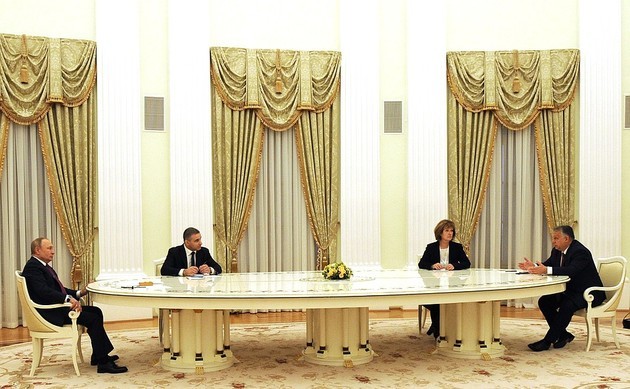The problems of ensuring European security became one of the main topics discussed at today's five-hour talks in the Kremlin between Vladimir Putin and Hungarian Prime Minister Viktor Orban. At the meeting, Putin said that over the 11 months of last year, trade increased by 30%; in Hungary, the construction of the Paks nuclear power plant continues. 55% of the oil and 80% of the gas consumed by Hungary comes from Russia. Last year, Gazprom signed two long-term contracts for the supply of natural gas to Hungary until 2036.
The President of the Russian Federation also recalled that Moscow had sent NATO and the United States its proposals for the conclusion of written mutual obligations on the subject of European security. Orban thanked Putin for his help in vaccinating against the coronavirus (900,000 Hungarian citizens were vaccinated by Sputnik-V), for oil and gas, and assured that none of the leaders of the countries of the European Union wants war, and everyone is in favor of a political solution to problems.
Daniel Hegedus, visiting fellow for Central Europe at the German Marshall Fund of the United States, says with this meeting, Orban is keen to kill two birds with one stone. On one hand he is keen to maintain his country's special relationship with Russia. On the other hand, in light of the upcoming Hungarian elections, he is keen to cater to his country's energy needs and seeks to increase the volume of gas supply from the Kremlin, Deutsche Welle writes.
According to Andras Racz, senior research fellow at the German Council on Foreign Relations, Orban's business policy to make his country self-sufficient in energy production also benefits the Kremlin. "In 2014, Hungary signed a contract with Russia's state nuclear energy corporation, Rosatom, to expand the Paks nuclear power project in Hungary by constructing two nuclear power plants. The project is funded through a €10 billion [$11 billion] loan from Russia and is a key element in improving Russia and Hungary's business relations," he told DW. "Prior to this deal, Rosatom had projects all over the world and not in the EU. Signing this deal with Hungary was very important for the company because many businesses are of the view that if you're good enough for the EU, you're good enough elsewhere," he added.
In September 2021, Hungary signed a long-term gas contract with Russia's Gazprom which ensures that 4.5 billion cubic meters of Russian gas will be supplied to Hungary via Serbia and Austria, circumventing Ukraine. The contract angered Ukrainian officials, with Ukrainian Foreign Minister Dmytro Kuleba saying the deal was signed "to defy Ukraine's national interests and Ukrainian-Hungarian relations."
The opposition party released a statement last week calling on Orban to cancel the meeting, saying the talks "send a message that NATO and EU member states are not united in rejecting Putin's proposals."
Oleg Ignatov, a senior analyst with the International Crisis Group, a think tank in Brussels, said "that Orban got everything he needed from Russia — a very favorable gas contract. The terms of this contract are also better than those of some other buyers of Russian gas. At the same time, Hungary does not diverge from the EU's policy toward Russia," he told DW.
Poland, the Czech Republic and Slovakia — who form the Visegrad 4 group together with Hungary — have backed NATO's military efforts to support Ukraine. But Hungary has been reluctant to show its support because of many past disagreements with Ukraine. There is no evidence that Hungary will take a different position to the EU on European security.
Besides NATO's efforts, US and EU leaders have also been debating imposing sanctions on Russia which include trade bans and cutting energy supplies. GMF's Hegedus said that although sanctions are on the table, Orban knows that anything he can do to defuse the crisis will also cater to his national interests. Hungary has a multilateral foreign policy. So a conflict in Ukraine would also put him in a tight spot where being a NATO and EU member he will have to balance issues between the West and Russia in order to maintain their special relationship with Moscow."






